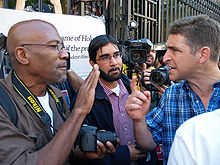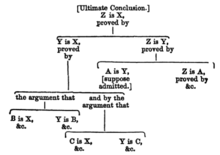
Back نظرية الحجج Arabic Аргументация Bulgarian Argumentació Catalan تیۆریی بەڵگەھێنانەوە CKB Argumentationsteori Danish Argumentationstheorie German Argumentoteorio Esperanto Teoría de la argumentación Spanish Théorie de l'argumentation French ארגומנטציה HE


Argumentation theory is the interdisciplinary study of how conclusions can be supported or undermined by premises through logical reasoning. With historical origins in logic, dialectic, and rhetoric, argumentation theory includes the arts and sciences of civil debate, dialogue, conversation, and persuasion. It studies rules of inference, logic, and procedural rules in both artificial and real-world settings.[1][2]
Argumentation includes various forms of dialogue such as deliberation and negotiation which are concerned with collaborative decision-making procedures.[3] It also encompasses eristic dialog, the branch of social debate in which victory over an opponent is the primary goal, and didactic dialogue used for teaching.[2] This discipline also studies the means by which people can express and rationally resolve or at least manage their disagreements.[4]
Argumentation is a daily occurrence, such as in public debate, science, and law.[5] For example in law, in courts by the judge, the parties and the prosecutor, in presenting and testing the validity of evidences. Also, argumentation scholars study the post hoc rationalizations by which organizational actors try to justify decisions they have made irrationally.
Argumentation is one of four rhetorical modes (also known as modes of discourse), along with exposition, description, and narration.
- ^ van Eemeren, Frans H.; Grootendorst, Rob (2004). A systematic theory of argumentation: the pragma-dialectical approach. New York: Cambridge University Press. p. 9–13. ISBN 0521830753. OCLC 51931118.
- ^ a b van Eemeren, Frans H.; Garssen, Bart; Krabbe, Erik C. W.; Snoeck Henkemans, A. Francisca; Verheij, Bart; Wagemans, Jean H. M. (2014). Handbook of argumentation theory. New York: Springer Verlag. pp. 65–66. doi:10.1007/978-90-481-9473-5. ISBN 9789048194728. OCLC 871004444.
At the start of Topics VIII.5, Aristotle distinguishes three types of dialogue by their different goals: (1) the truly dialectical debate, which is concerned with training (gumnasia), with critical examination (peira), or with inquiry (skepsis); (2) the didactic discussion, concerned with teaching; and (3) the competitive (eristic, contentious) type of debate in which winning is the only concern.
- ^ Jory, Constanza Ihnen (May 2016). "Negotiation and deliberation: grasping the difference". Argumentation. 30 (2): 145–165 [146]. doi:10.1007/s10503-014-9343-1. S2CID 189944698.
- ^ Walton, Douglas N. (1990). "What is Reasoning? What Is an Argument?". The Journal of Philosophy. 87 (8): 399–419. doi:10.2307/2026735. JSTOR 2026735.
- ^ Palau, Raquel Mochales; Moens, Marie-Francine (2009-06-08). "Argumentation mining". Proceedings of the 12th International Conference on Artificial Intelligence and Law. ICAIL '09. New York, NY, USA: Association for Computing Machinery. pp. 98–107. doi:10.1145/1568234.1568246. ISBN 978-1-60558-597-0. S2CID 1788414.
© MMXXIII Rich X Search. We shall prevail. All rights reserved. Rich X Search